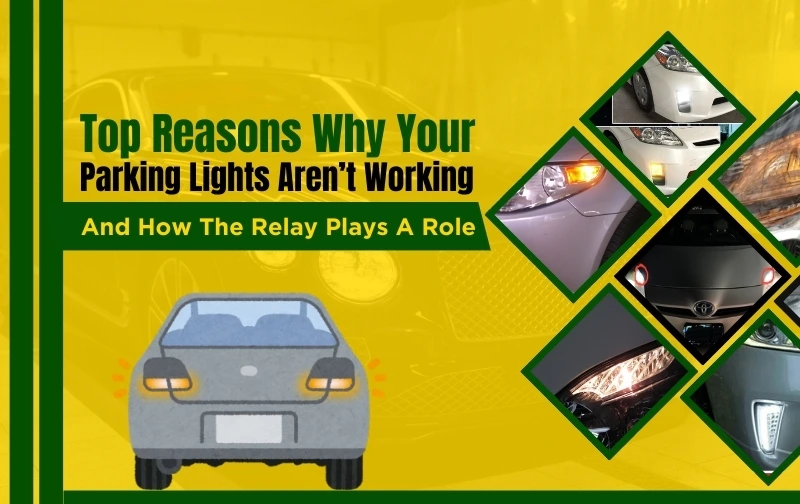When driving at night or in low-visibility conditions, your parking lights serve as a crucial safety feature. If you’ve noticed that your parking lights aren’t functioning, it can be both frustrating and hazardous. One key component in this circuit is the parking light relay . In this blog, we’ll explore the reasons why your parking lights may not be working and how the relay plays an integral role in their function. Additionally, we’ll guide you on where to find these components, particularly focusing on resources from BS Auto Supplies.
Understanding the Parking Light Relay
The parking light relay is an electrical switch that controls the flow of electricity to your parking lights. Activating your parking lights will engage the relay which in turn allows power to reach the bulbs. If the relay is malfunctioning, it can disrupt this circuit, causing your parking lights to fail.
Common Symptoms of a Faulty Parking Light Relay
Before diving into specific reasons why your parking lights aren’t working, it’s essential to identify the symptoms of a faulty parking light relay:
Parking Lights Won’t Turn On: The most obvious symptom is that your parking lights do not illuminate at all when activated.
Intermittent Functioning: Your parking lights may flicker or work sporadically. This can reflect either a loose connection or a failing relay.
Dim Lights: If your parking lights are dimmer than usual, it could signal an issue with the relay or insufficient power reaching the bulbs.
Burnt Bulbs: If your bulbs burn out frequently, it might be a sign of electrical issues caused by a faulty relay.
Top Reasons Your Parking Lights Aren’t Working
Now that we understand the role of the parking light relay, let’s explore the top reasons your parking lights may not be functioning:
Faulty Parking Light Relay: The most straightforward reason for non-functioning parking lights is a defective parking light relay. Over time, relays can wear out due to heat and continuous use. If you suspect this is the issue, checking the parking light relay location in your vehicle is your first step. Check and you may see it in the fuse box, either under the dashboard or in the engine compartment.
Blown Fuse: Your parking lights often share a fuse with other lighting components. If this fuse is blown, it will interrupt the power flow to your parking lights. Locate the fuse box, check for any blown fuses related to the parking lights, and replace them as necessary. Ensure you use the correct amperage to avoid future issues.
Damaged Wiring: Wiring issues can also lead to malfunctioning parking lights. Observe any signs of fraying or damage in the wires that lead to the parking lights or the relay. Sometimes, rodents may chew through wiring, leading to shorts. Consider finding a professional repair or replacement in the case you find any damaged wiring,
Bad Light Bulbs: It may sound simple, but burnt-out bulbs can often go unnoticed. Check the bulbs for your parking lights to see if they need replacement. Sometimes, a bulb might appear intact but could have an internal break. Always replace bulbs that meet your vehicle’s specifications.
Grounding Issues: A poor ground connection can also cause your parking lights to malfunction. The ground wire should connect securely to the vehicle’s chassis. If this connection is loose or corroded, it can lead to intermittent lighting or complete failure.
How to Replace the Parking Light Relay
If you’ve determined that the parking light relay is indeed the problem, you can replace it relatively easily. Here’s a quick guide:
Locate the Relay: Use your vehicle's manual to find the parking light relay location.
Remove the Old Relay: Gently pull out the relay from its socket. You may need to use a small flathead screwdriver to pry it out if it’s stuck.
Insert the New Relay: Purchase a replacement relay from a reliable source, such as BS Auto Supplies, and install it by pushing it firmly into the socket.
Test Your Parking Lights: Once the new relay is in place, turn on your parking lights to ensure they function correctly.
When to Seek Professional Help
While replacing a parking light relay can be a DIY task, there are times when it’s best to consult a professional. If you’ve gone through the basic troubleshooting steps and still can’t find the issue, or if you suspect a more complex electrical problem, a qualified mechanic can diagnose and repair the issue effectively.
Conclusion
Understanding the role of the parking light relay and recognizing the common symptoms of failure can save you time and frustration when your parking lights malfunction. By checking the relay, fuses, wiring, and bulbs, you can often identify and resolve the issue. If you need replacement parts or further assistance, BS Auto Supplies is your go-to resource for high-quality automotive components. Regularly check your lighting systems and ensure all components, including the parking light relay, are in optimal condition. This proactive approach will help you avoid unexpected failures and keep your vehicle running smoothly.









0 Comments